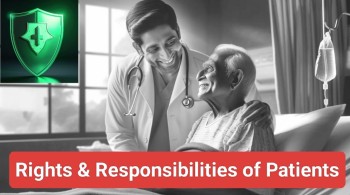Dealing with Pharmaceutical Companies-Do’s & Don’ts For Doctors
Doctors and professional association of doctors have to be very careful in their relationship with pharmaceutical and allied health sector industry. Violation of any rule prescribed in the Indian Medical Council (Professional Conduct, Etiquette and Ethics) Regulations, 2002 may put concerned doctor in trouble.
In dealing with Pharmaceutical and allied health sector industry, a medical practitioner shall follow and adhere to the stipulations given below:-
Gifts: A medical practitioner shall not receive any gift from any pharmaceutical or allied health care industry and their sales people or representatives.
Travel facilities: A medical practitioner shall not accept any travel facility inside the country or outside, including rail, air, ship , cruise tickets, paid vacations etc. from any pharmaceutical or allied healthcare industry or their representatives for self and family members for vacation or for attending conferences, seminars, workshops, CME programme etc as a delegate.
Hospitality: A medical practitioner shall not accept individually any hospitality like hotel accommodation for self and family members under any pretext.
Cash or monetary grants: A medical practitioner shall not receive any cash or monetary grants from any pharmaceutical and allied healthcare industry for individual purpose in individual capacity under any pretext. Funding for medical research, study etc. can only be received through approved institutions by modalities laid down by law / rules / guidelines adopted by such approved institutions, in a transparent manner. It shall always be fully disclosed.
Medical research and Doctors:
A medical practitioner may carry out, participate in, and work in research projects funded by pharmaceutical and allied healthcare industries. A medical practitioner is obliged to know that the fulfillment of the following items will be an imperative for undertaking any research assignment / project funded by industry for being proper and ethical. Thus, in accepting such a position a medical practitioner shall:-
(i) Ensure that the particular research proposal(s) has the due permission from the competent concerned authorities.
(ii) Ensure that such a research project(s) has the clearance of national/ state / institutional ethics committees / bodies.
(iii) Ensure that it fulfils all the legal requirements prescribed for medical research.
(iv) Ensure that the source and amount of funding is publicly disclosed at the beginning itself.
(v) Ensure that proper care and facilities are provided to human volunteers, if they are necessary for the research project(s).
(vi) Ensure that undue animal experimentations are not done and when these are necessary they are done in a scientific and a humane way.
(vii) Ensure that while accepting such an assignment a medical practitioner shall have the freedom to publish the results of the research in the greater interest of the society by inserting such a clause in the MoU or any other document / agreement for any such assignment.
Maintaining Professional Autonomy:
In dealing with pharmaceutical and allied healthcare industry a medical practitioner shall always ensure that there shall never be any compromise either with his / her own professional autonomy and / or with the autonomy and freedom of the medical institution.
Affiliation:
A medical practitioner may work for pharmaceutical and allied healthcare industries in advisory capacities, as consultants, as researchers, as treating doctors or in any other professional capacity. In doing so, a medical practitioner shall always:
(i) Ensure that his professional integrity and freedom are maintained. (ii) Ensure that patient’s interest is not compromised in any way.
(iii) Ensure that such affiliations are within the law.
(iv) Ensure that such affiliations / employments are fully transparent and disclosed.
Endorsement:
A medical practitioner shall not endorse any drug or product of the industry publically. Any study conducted on the efficacy or otherwise of such products shall be presented to and / or through appropriate scientific bodies or published in appropriate scientific journals in a proper way”.
Running an open shop (Dispensing of Drugs and Appliances by Physicians): -
A physician should not run an open shop for sale of medicine for dispensing prescriptions prescribed by doctors other than himself or for sale of medical or surgical appliances. It is not unethical for a physician to prescribe or supply drugs, remedies or appliances as long as there is no exploitation of the patient. Drugs prescribed by a physician or brought from the market for a patient should explicitly state the proprietary formulae as well as generic name of the drug.
In conclusion, adherence to the ethical guidelines outlined in the Indian Medical Council's regulations is paramount for doctors and medical practitioners. Maintaining integrity in their interactions with the pharmaceutical and allied health sector industry is not only a legal requirement but also a fundamental ethical responsibility. By upholding these standards, healthcare professionals can ensure the trust and well-being of their patients while contributing to the overall integrity of the medical profession in India.












Recent comments
Latest Comments section by users
Guest
May 11, 2024
555
Guest
May 11, 2024
555
Guest
May 11, 2024
555
Guest
May 11, 2024
555